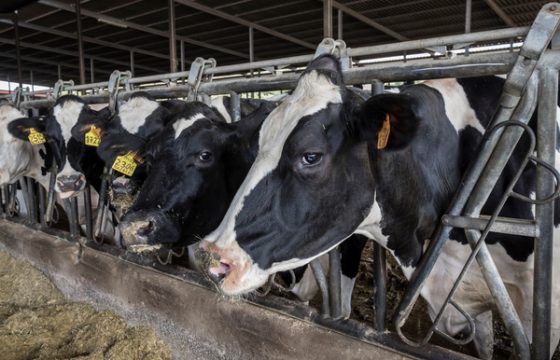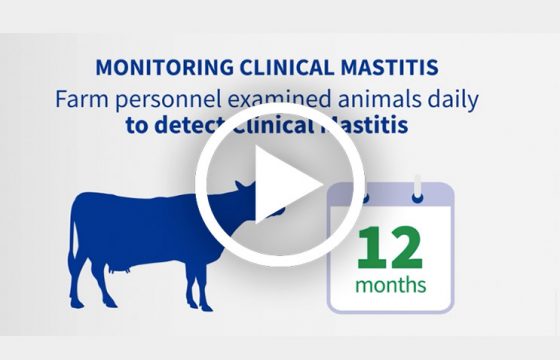Environmental control (IV): Preparing your herd against bovine mastitis during lactation.
Dry cows are often the forgotten cows, and the environment has huge effects on bovine mastitis. Therefore, prevention of bovine mastitis by environmental bacteria starts with dry cows. You’ll find in this post valuable information regarding the environment in dry cows and regarding how to prepare your herd in order to avoid bovine mastitis infections during lactation.
Dry cow pens are sometimes the forgotten pens, because they do not produce milk.
This is a great mistake, since many new clinical cases of bovine mastitis that occur during the first 100 days in milk originate in the dry period, as reported in scientific studies:
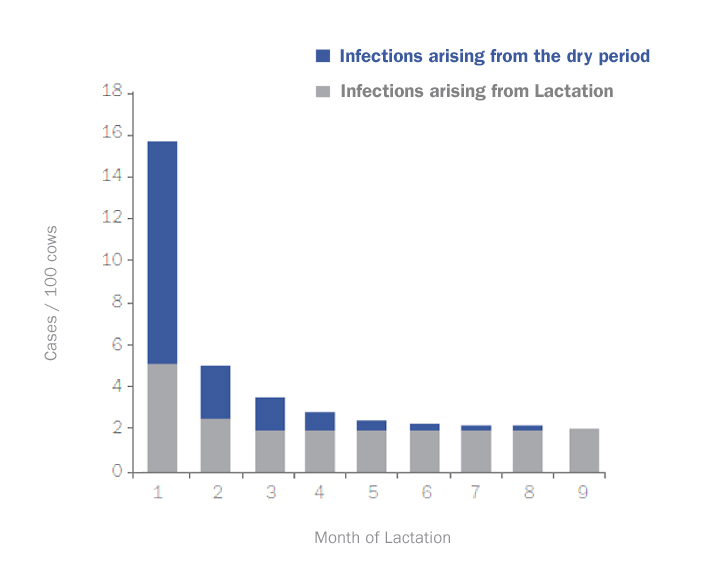 Cases of bovine mastitis infections on the dry period vs on lactation.Adapted from A. J. Bradley. Vet Clin Food Anim 20. (2004) 547 568.
Cases of bovine mastitis infections on the dry period vs on lactation.Adapted from A. J. Bradley. Vet Clin Food Anim 20. (2004) 547 568.
We can therefore say that prevention of bovine mastitis by environmental bacteria starts with dry cows.
From a milk quality standpoint, we tend to say that new lactation does not start when the cow calves. It starts when that cow is dried off. The highest risk of new infection is just after drying off and around calving, as shown in the graph below, so environmental conditions in dry cows and close up cows must be at least as excellent as for the lactating animals.
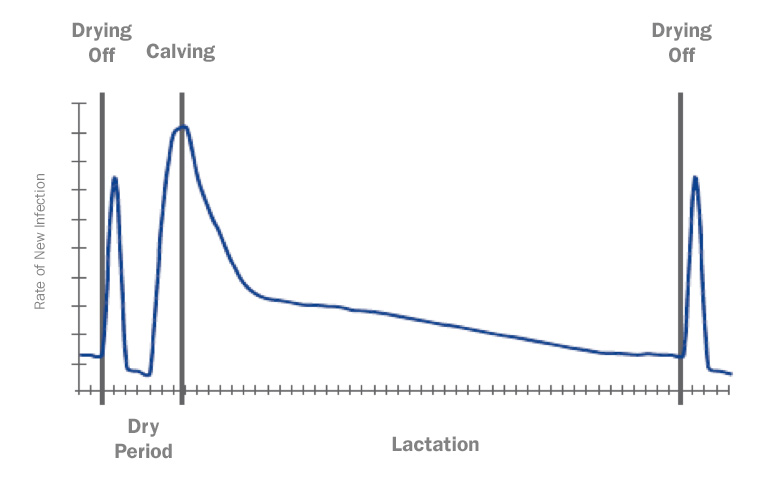 Rate of bovine mastitis Infections (Dry Period vs Infection). Adapted from A. J. Bradley. Vet Clin Food Anim 20 (2004) 547 568.
Rate of bovine mastitis Infections (Dry Period vs Infection). Adapted from A. J. Bradley. Vet Clin Food Anim 20 (2004) 547 568.
Facilities design
a) Types of facilities
There are three types of facility where the cows can rest:
- Tie stall
- Free stall
- Bedded pack pens
Regardless of the type of material used for bedding, design, stocking density and maintenance play a huge role in environmental control of bovine mastitis in this kind of facility.
Remember that we have to provide a clean, dry and comfortable environment for the cows if we want to make them perform correctly. In terms of milk production, but also for control of diseases such as bovine mastitis or lameness.
A poor freestall design will compromise cow comfort and will make it more difficult to keep bedding clean. If freestalls are not comfortable enough, cows will look for another place to lie down, such as in the alleys.
Below right is a design for freestalls:
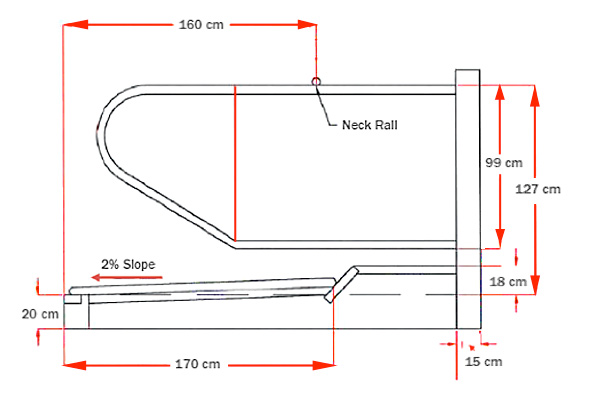 A poor freestall design will make it more difficult to keep bedding clean and thus, to avoid bovine mastitis infections in dairy cows.
A poor freestall design will make it more difficult to keep bedding clean and thus, to avoid bovine mastitis infections in dairy cows.
As regards density, for pens with freestalls, the rule of thumb is one freestall per cow in the pen. Despite this, we can find farms working with 2-5% extra cows with no problems. Obviously this situation is not advisable, but we do find it on some farms.
At this point, excellent bedding maintenance is absolutely essential. More than 5% overdensity will lead to environmental problems.
For the bedded pack pens, recommended areas per cow are as follows:
- Lactating cows: 10 m2/cow
- Dry off cows: 8 m2/cow
- Close up cows: 11 m2/cow
- Maternity: from 13 to 18 m2/cow
b) Maintenance and Ventilation
These recommended areas are useless if good maintenance and excellent ventilation are not provided. Also, heat stress will play a major role in bovine mastitis if the cows are not distributed evenly along the pen.
When cows suffer heat stress they tend to group in one area of the barn. Usually where the main wind comes into the barn, but sometimes they group in a corner just because they are stressed and they react as some ruminants do in the face of a stressing situation, by grouping. The bedding in these areas becomes very wet and dirty and it became an important source of bacteria that may cause some health problems such as bovine mastitis.
We can see the same situation when we have a great many flies in the barn. Flies are extremely annoying for the cows and must be controlled in order to prevent cows grouping.
Water trough location is also very important. It is common in old facilities to find water troughs inside the bedding areas, producing very wet areas surrounding them, especially in summer time. The areas around water points are also an important source of bacteria.
For freestall pens, water points must be installed in the crossing alleys if a barn has 3 rows of freestalls. These crossing alleys should measure at least 4 to 5 meters in width. For a 2-row barn, the water point must be in the rear alley.
For bedded pens, water points must be out of the resting area, in the alley. Also the rear part of the water point can be protected with a piece of stainless steel so as not wet the resting area.
Correct ventilation is another important issue.
As bacteria need humidity to grow, providing fresh and clean air will reduce the bacterial count of the bedding and the risk of these bacteria to grow and cause bovine mastitis, among other problems. Cows will also distribute evenly all along the resting area.
Of course, we must first increase natural ventilation, but also be prepared to install fans when necessary.
Take-home messages about environmental control to prevent bovine mastitis:
- Cows must be clean, dry and comfortable at all times.
- Choose the right bedding material. Inorganic materials are always better than organic if we are thinking about milk quality.
- Other factors such as availability, price and manure handling facilities will determine one material or another.
- Very good maintenance can reduce the effects of bad bedding material. Bad management can destroy the benefits of good bedding material. Proper management is the most important aspect of cows’ bedding.
- Cow hygiene is not a choice. It has to be a farmer’s commitment.
Content originally created for “the Mastipedia”.
Authors: Oriol Franquesa and Demetrio Herrera (Udder health and milk quality consultants).
